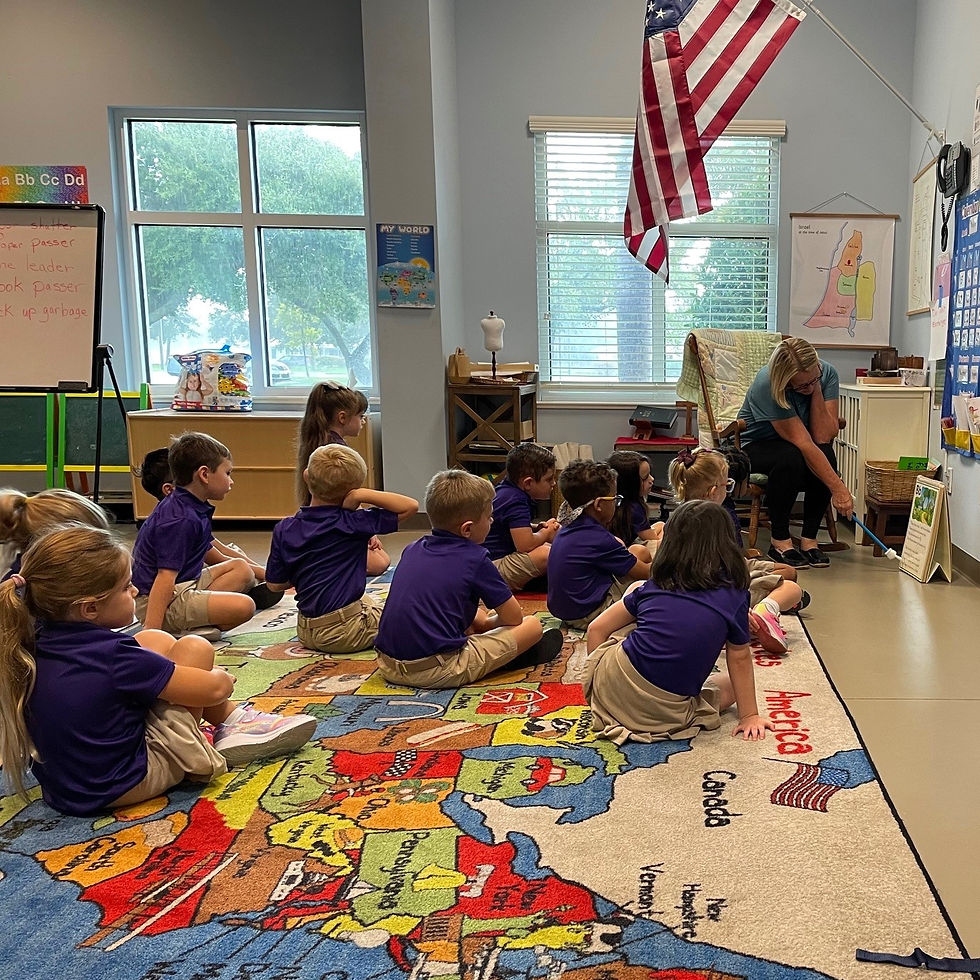Why Children Need Their Hands, Bodies, and Real-World Experiences to Truly Learn
- Christ Church Academy

- Jun 24
- 3 min read
Updated: Jun 25

In our rush to digitize childhood education, we're overlooking something fundamental about how young minds actually develop. Annie Murphy Paul's groundbreaking work in "The Extended Mind" reveals that thinking isn't confined to our brains—it extends through our bodies and into the physical world around us. For children, this insight is particularly crucial.
Paul demonstrates that our cognitive abilities are dramatically enhanced when we engage our bodies in the learning process. When children manipulate objects, move through space, and use their hands to explore, they're not just playing—they're building neural pathways that abstract thinking alone simply cannot create. The brain develops through embodied experience, with physical interaction serving as the scaffold for later conceptual understanding.
Consider how a child learns mathematics. While worksheets might teach them to recognize numbers, it's through counting blocks, measuring ingredients while cooking, or building with LEGOs that they develop genuine number sense. The tactile experience of "ten" felt through ten objects creates a robust mental representation that no amount of screen-based learning can replicate.
This principle extends far beyond academics. Children who spend time in nature, who build forts, who take things apart and put them back together, are developing problem-solving abilities, spatial reasoning, and creative thinking that will serve them throughout their lives. Their extended mind is learning to use the environment as a thinking partner.
The Musical Advantage: Real-Time Feedback Across All Senses
Musical training exemplifies this embodied learning in action. When children learn an instrument, they receive immediate feedback through multiple sensory channels simultaneously. They hear whether the note is correct, feel the vibration in their body, see their finger placement, and sense the physical resistance of the keys or strings. This multi-sensory feedback loop creates incredibly rich learning experiences.
Unlike academic subjects where feedback might come hours or days later through graded assignments, music provides instant correction. A wrong note sounds wrong immediately—there's no ambiguity, no waiting for external validation. This real-time feedback accelerates learning and builds the kind of self-correcting awareness that transfers to other areas of life.
The physical demands of musical performance also strengthen the connection between intention and execution. Children learn to coordinate their breathing, finger movements, timing, and attention in precisely synchronized ways. This integration of mind and body builds executive function skills that enhance everything from academic performance to emotional regulation.
Research consistently shows that musically trained children demonstrate enhanced language development, mathematical reasoning, and spatial intelligence. But the benefits run deeper than test scores—they're developing a more integrated way of being in the world, where thinking happens through their whole being rather than just their heads.
Real-World Experiences and Academic Learning
The implications are clear: children need rich, hands-on experiences with the physical world. They need time to explore without predetermined outcomes, to build and create with their hands, to move their bodies through space. They need experiences that engage multiple senses simultaneously and provide immediate, natural feedback.
This doesn't mean rejecting all technology, but rather ensuring that digital experiences complement rather than replace real-world experiences in learning. A child who has spent years manipulating physical objects will bring much richer understanding to digital simulations than one who has only known screens.
At Christ Church Academy we've used this understanding to design our curriculum to enhance learning and make it fun for the children. This approach not only provides a tangible connection to abstract concepts, it also enhances concentration and focus. Our preschool and lower school curriculum incorporates opportunities to build, create, and explore in all areas of the curriculum and music is a very important part of our program.
The extended mind reminds us that intelligence isn't something that happens in isolation—it emerges through our interaction with the world. For children, whose brains are still forming fundamental patterns of learning, these concrete experiences aren't just helpful—they're irreplaceable foundations for a lifetime of thinking, creating, and understanding.

